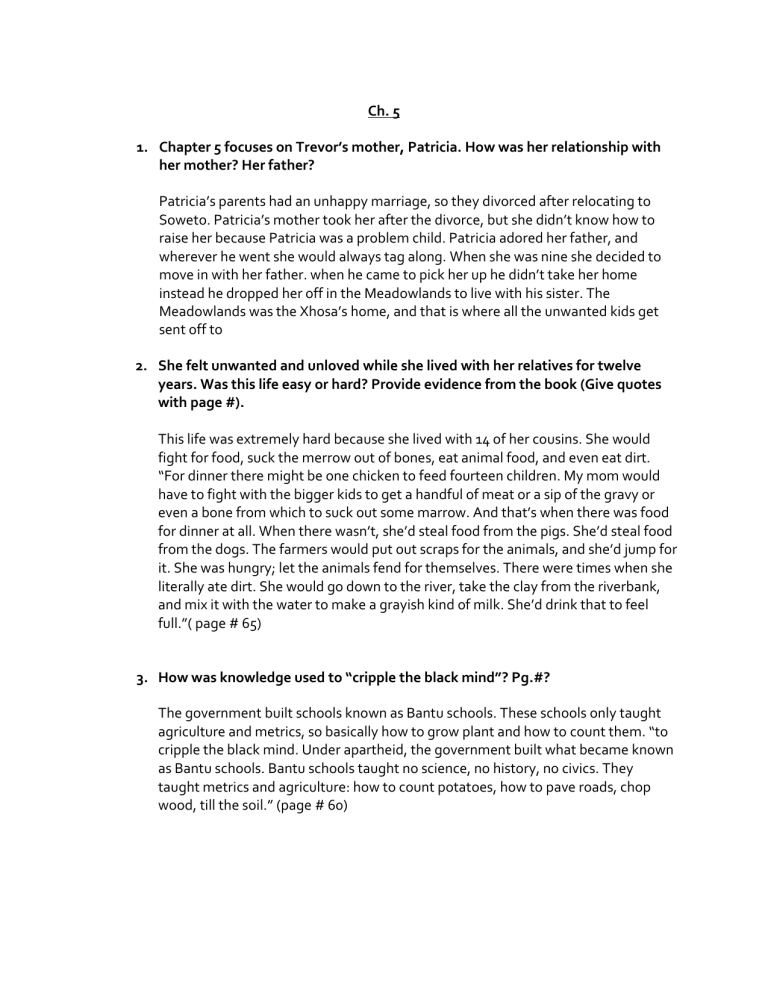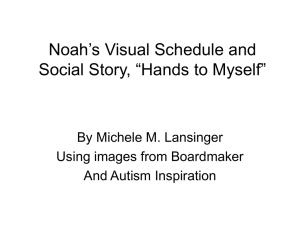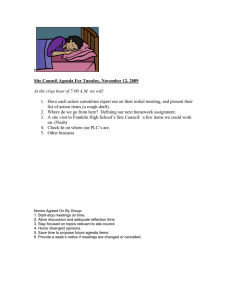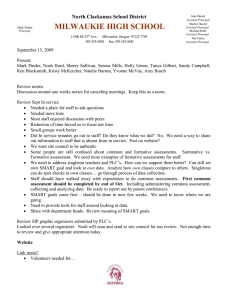
Ch. 5 1. Chapter 5 focuses on Trevor’s mother, Patricia. How was her relationship with her mother? Her father? Patricia’s parents had an unhappy marriage, so they divorced after relocating to Soweto. Patricia’s mother took her after the divorce, but she didn’t know how to raise her because Patricia was a problem child. Patricia adored her father, and wherever he went she would always tag along. When she was nine she decided to move in with her father. when he came to pick her up he didn’t take her home instead he dropped her off in the Meadowlands to live with his sister. The Meadowlands was the Xhosa’s home, and that is where all the unwanted kids get sent off to 2. She felt unwanted and unloved while she lived with her relatives for twelve years. Was this life easy or hard? Provide evidence from the book (Give quotes with page #). This life was extremely hard because she lived with 14 of her cousins. She would fight for food, suck the merrow out of bones, eat animal food, and even eat dirt. “For dinner there might be one chicken to feed fourteen children. My mom would have to fight with the bigger kids to get a handful of meat or a sip of the gravy or even a bone from which to suck out some marrow. And that’s when there was food for dinner at all. When there wasn’t, she’d steal food from the pigs. She’d steal food from the dogs. The farmers would put out scraps for the animals, and she’d jump for it. She was hungry; let the animals fend for themselves. There were times when she literally ate dirt. She would go down to the river, take the clay from the riverbank, and mix it with the water to make a grayish kind of milk. She’d drink that to feel full.”( page # 65) 3. How was knowledge used to “cripple the black mind”? Pg.#? The government built schools known as Bantu schools. These schools only taught agriculture and metrics, so basically how to grow plant and how to count them. “to cripple the black mind. Under apartheid, the government built what became known as Bantu schools. Bantu schools taught no science, no history, no civics. They taught metrics and agriculture: how to count potatoes, how to pave roads, chop wood, till the soil.” (page # 60) 4. How did Noah’s mother empower him to succeed in life? Pg.#? the Xhosa name their children to what their destiny going to be. For example Mlungisi “The Fixer”, and that’s what he did he was always doing chores and helping around. When Trevor was born Patricia didn’t want to give him a name that tied his fate so she picked Trevor. “When it was time to pick my name, she chose Trevor, a name with no meaning whatsoever in South Africa, no precedent in my family. It’s not even a Biblical name. It’s just a name. My mother wanted her child beholden to no fate. She wanted me to be free to go anywhere, do anything, be anyone.”(page #67) 5. How does Noah provide support for his assertion about the connection between knowledge and freedom? Pg.#? Noah’s mother had a very rough childhood, but she had English. English not only gave her more freedom but also gave her a white-collar job. “She didn’t have food or shoes or even a pair of underwear, but she had English. She could read and write. … My mom enrolled in the secretarial course that allowed her to grab hold of the bottom rung of the white-collar world.” 6. How does Noah use juxtaposition to establish the difference between British and Afrikaner racism? What does he want the reader to know about these types of racism? Note: juxtaposition compares and contrasts two different things, ideas, or individuals (often to highlight the differences but there can still be similarities) Pg.#? They are both similar because they both discriminate against people that are not white. They are different because the British gave the natives hope. The British mind set was if they can speak English and they can learn how to dress themselves they might be welcome in society. The Afrikaner said why even bother The difference between British racism and Afrikaner racism was that at least the British gave the natives something to aspire to. If they could learn to speak correct English and dress in proper clothes, if they could Anglicize and civilize themselves, one day they might be welcome in society. The Afrikaners never gave us that option. British racism said, ‘If the monkey can walk like a man and talk like a man, then perhaps he is a man.’ Afrikaner racism said, ‘Why give a book to a monkey?’”(page #60) 7. What characteristic of Noah’s mother does he develop when establishing her “search for belonging”? Pg.#? Even after her family abandoned her persistence to find where she belongs was endless. She finally found where she belonged after having Trevor. She loved him and he loved her back unconditionally. “My mother used to tell me, ‘I chose to have you because I wanted something to love and something that would love me unconditionally in return.’ I was a product of her search for belonging. She never felt like she belonged anywhere. She didn’t belong to her mother, didn’t belong to her father, didn’t belong with her siblings. She grew up with nothing and wanted something to call her own.”(page #63) Ch. 6 1. How does Noah establish the illogical nature of Apartheid? Pg.#? The Apartheid wasn’t logical because Chinese people were classified as black because there wasn’t enough of the to get their own category. On the other hand Japanese people were labeled as white because the South African government wanted to establish good relations with the Japanese in order to import their fancy cars and electronics. “So Japanese people were given honorary white status while Chinese people stayed black. I always like to imagine being a South African policeman who likely couldn’t tell the difference between Chinese and Japanese but whose job was to make sure that people of the wrong color weren’t doing the wrong thing. If he saw an Asian person sitting on a whites-only bench, what would he say?”(page #75) 2. Trevor admits he was a “naughty” kid growing up & received several “hidings.” How did the punishments affect him? Did they make him change? Why or why not? Pg.#? The punishments that Trevor received did not affect him at all. He just kept doing naughty things, and try his best not to get caught by his mother. He was defiantly scared to get a “hiding” but after he would still do mischievous things. “My mom was forever trying to rein me in. Over the years, her tactics grew more and more sophisticated. Where I had youth and energy on my side, she had cunning, and she figured out different ways to keep me in line.” (page #80) 3. How does Noah contrast his discipline at home and outside of the home? Pg.#? Noah’s discipline outside of home was nothing compared to the discipline he got at home. “Whenever the principal would hit me, it was like he was afraid to do it too hard. One day I was getting a hiding and I thought, Man, if only my mom hit me like this, and I started laughing. I couldn’t help it. The principal was quite disturbed. ‘If you’re laughing while you’re getting beaten,’ he said, ‘then something is definitely wrong with you.’”(page #85) 4. How does Noah characterize his and his mother’s relationship? Pg.#? He characterized it almost like they were rivels. He was the criminal that would always mange to escape. She was the cop he could never get rid of “My relationship with my mom was like the relationship between a cop and a criminal in the movies—the relentless detective and the devious mastermind she’s determined to catch. They’re bitter rivals, but, damn, they respect the hell out of each other, and somehow they even grow to like each other.”(page #80) 5. Why does Noah’s mother communicate with her son via letters? Pg.#? Noah’s mother would communicate with her son via letters that way she can make her point, and he can’t argue back right away. “So she started writing me letters. That way she could make her points and there could be no verbal sparring back and forth. If I had chores to do, I’d come home to find an envelope slipped under the door, like from the landlord.” (page #82) 6. Overall, do you think Noah’s mother treated him fairly? Why or why not? Be specific. Yes, I think Noah’s mother treated him fairly. She would talk to him like an adult and treat him like an adult. When he was right she stood with him, and when he was wrong she beat him. With every decision she made she had his best interests in mind. She wanted him to succussed in life, and live a much better life then hers. 7. What is the author’s tone in chapter 6? Provide a sentence or two from the book (and give page #) that you think reveals the tone. The author’s tone in chapter 6 is Love and Personal Growth. Patricia didn’t push Trevor away like her family did with her. She loved him and disciplined him and he loved her. They were a team. That was the weird and kind of amazing thing about my mom. “If she agreed with me that a rule was stupid, she wouldn’t punish me for breaking it. Both she and the psychologists agreed that the school was the one with the problem, not me. Catholic school is not the place to be creative and independent.”(page #87-88)




